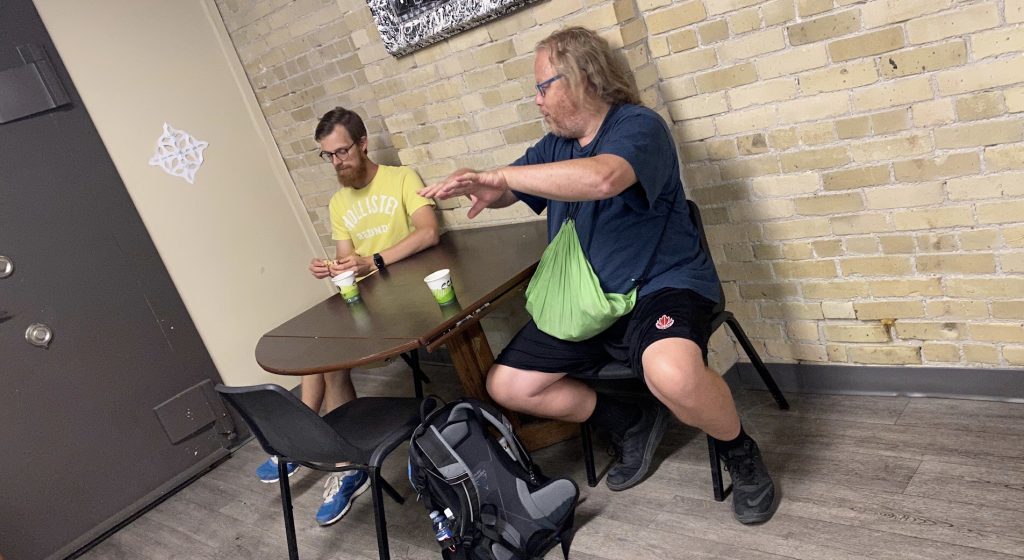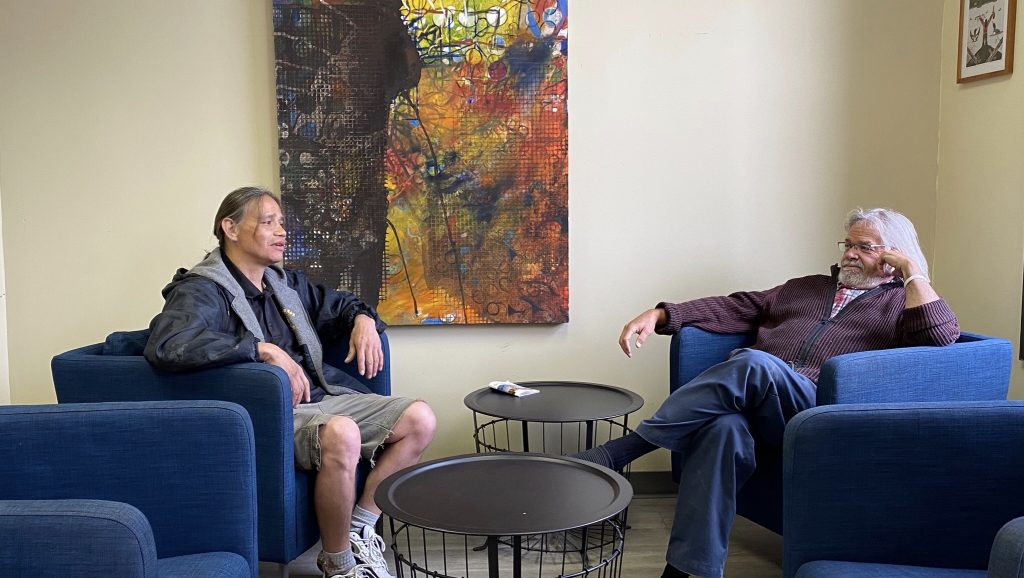Community & Presence (Part 3)
[this is part 3. You can find Part 1 here and Part 2 here]
Part 3: PRACTISES OF PRESENCE (A)
The nature of our community is that life/death cycles look different than a more traditional church setting. We have friends that die violently and tragically after years of addiction, abuse, and harmful social settings. We were struck that someone in our community could pass away and it would really matter little to anyone. So we started to value each person’s story, recognizing the worth of each person as an image-bearer of the divine. If we are going to take being present with each other seriously, one of the practises is to listen to each other’s stories. We do this both as a way of saying “who you are and what you have gone through matters” and as a way of seeing life/faith from a different perspective. Like all of us, my upbringing, experience, and tradition shapes my relationship with God and perspective on life. In being present with people at the margins, I see the limited nature of my own perspective and find a richness in listening to and connecting in with the perspective that others bring.
One such area is nature of addictions. While I have friends who are addicted to substances that are illegal and/or harmful, the nature of that addiction is not so different than my own. I can laugh at my profound need for caffeine by 10:30am or sheepishly shrug off that I look to food to bring comfort when life is stressful. However, the relentless cycle of trying to cope with trauma and stress, sadness and shame is part of our humanity. We judge the alcoholic who is trying to forget the trauma and shame of abuse as a young child but encourage the person who accumulates possessions as a way of coping with stress (“the more you buy, the more you save!”). When we hear each others’ stories, we see the commonality within our humanness.
There’s a humanization that occurs when the church is present-with people at the margins. That’s part of what happens when you listen to a person’s story. You begin to call others out of a sense of worthlessness and into their place as daughters and sons of God. In doing so, the church speaks the expectation of re-creation into them. I feel this is an important part of the church’s role in reclaiming a person’s identity as a beloved child of God. The prevailing values in our society dehumanize people at the margins, telling them that they are failures whose lives and stories matter very little to the larger populace. This is not the message of the gospel, however. Historians argue that the early church saw an influx of marginalized and oppressed people because of the humanization inherent in the gospel of salvation. Missiologist Lesslie Newbigin wrote, “The Gospel was doing what it has always done, making it possible for those who were formerly ‘no people’ to become God’s people.”

When marginalized people are invited into the faith community as full participants in the body of Christ, there is a value and dignity afforded to them that they do not experience elsewhere. This is a significant part of the journey towards Christlikeness. The cultural narrative divides people along a variety of lines – socio-economic, racial, gender. This creates an “us-them” mentality in the church which hinders re-creation as the ‘them’ are kept at a distance. When a person is identified as being ‘in Christ,’ it begins to remove the us-them division and creates a community of equals; equal in the sense that every person has a poverty from which he/she needs to be delivered. Equal in the sense that the Spirit is at work in each person, equipping him/her to find his/her place in the kingdom of God. Rather than seeing the person as part of a socio-economic group called “the marginalized,” being part of the church community gives a person the sense that he/she is part of the larger work that God is doing in the world.
Its easy to romanticize this. The truth is that being present with addicts, homeless, marginalized people is messy work – emotionally, spiritually, physically. Being present pushes on the boundaries of personal security, safety, pushes up against your fears. Jesus’ words in sermon on the mount “Blessed are the peacemakers, they will be known as children of God” compel us to insert ourselves and stand in the midst of the messiness, to face it rather than simply ask it to leave. In a society (religious & secular) that so values safety & personal well-being, being present with people at the margins pushes up against that boundary.
I believe its important that the church is on ground level with people because of what the church is. Within society there are few organizations/communities that transcend social boundaries better. This creates opportunity for the church to have influence within the social systems. But it has to be patiently present. Our experience is that while social organizations are willing to work with churches, the fickleness of churches mean that we must prove ourselves. Will we be in it for the long haul? But when done as a ‘present-with’ church, there is opportunity. This can be as simple as helping a person with literacy and/or mental health issues navigate and walk through a social system that is often over-worked and somewhat broken. After being present where we are for 8 years, we are gaining trust of social organizations who are not only willing to talk to us but willing to work with us in order to find solutions for a person’s well-being.

It can also mean addressing some social issues that plague our friends – particularly in terms of housing and employment. Affordable housing that is connected to healthy community has the potential to create a sustainable living environment that is more than just a roof over a person’s head. Or having businesses that are willing to take the risk with a person at the margins, recognizing that the value that is built into a person when they are able to work and accomplish a task but willing to extend grace when a person trips up. The structure of a work environment (reason to get up, to be somewhere, knowing you are needed) helps combat boredom which is such as issue when it comes to addictive behaviour.
And its not simply that the church has resources but its the coming together of resources, influence, and presence as a reflection of the love of Christ which is the catalyst in all of this (2 Corinthians 5.14-21). For all our social issues for which we are trying to find solutions, until we are ready as a society to be present with each other – live well – we will always simply be shifting issues around. The presence of the church needs to be a patient presence. I don’t mean patience like a parent who is trying to wait patiently while a young child learns to zip up their jacket. I mean patience in the sense that moving out of old habits and patterns is messy. There is so much to untangle with it being so much more complex than simply ‘stop using,’ or ‘get a place,’ or ‘get a job.’ As the church is present-with marginalized people, it patiently joins them in wrestling with the tension of moving out of an old life into a new one. So another practise of presence is patience. We have a God who is patient with us through Christ and we extend that gracious patience to each other.
Part 4: More Practises of Presence
